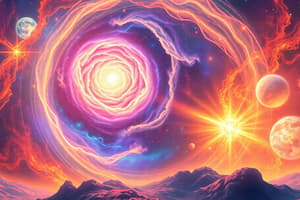Podcast
Questions and Answers
What does the steady state theory suggest about the universe?
What does the steady state theory suggest about the universe?
The universe has no beginning and no end.
What is a key aspect of the steady state theory?
What is a key aspect of the steady state theory?
- The universe continuously expands. (correct)
- The universe has a finite age.
- The universe is static.
- The universe is contracting.
According to the steady state theory, the density of the universe changes over time.
According to the steady state theory, the density of the universe changes over time.
False (B)
How does the volume of a container relate to its mass according to the given analogy?
How does the volume of a container relate to its mass according to the given analogy?
Who are the proponents of the steady state theory?
Who are the proponents of the steady state theory?
What is one negative implication of the steady state theory?
What is one negative implication of the steady state theory?
What does the steady state theory propose about the universe?
What does the steady state theory propose about the universe?
The steady state theory indicates that the universe continuously expands while simultaneously creating matter.
The steady state theory indicates that the universe continuously expands while simultaneously creating matter.
Which of the following is a characteristic of the steady state theory?
Which of the following is a characteristic of the steady state theory?
The density of the universe remains __________ according to the steady state theory.
The density of the universe remains __________ according to the steady state theory.
What is the opposing theory to the steady state theory that describes the origin of the universe?
What is the opposing theory to the steady state theory that describes the origin of the universe?
What do proponents of the steady state theory believe about the fate of the universe?
What do proponents of the steady state theory believe about the fate of the universe?
Flashcards are hidden until you start studying
Study Notes
Overview of Unit 1
- Focus on the origin of the universe and solar system theories.
- Key theories include Big Bang Theory, Steady State Theory, Nebular Theory, and Encounter Theory.
Lesson 1.1: Big Bang Theory
- Introduces the prevailing cosmological explanation for the universe's origin.
- Explains the expansion of the universe from an extremely hot and dense state.
- Discusses supporting evidence such as cosmic microwave background radiation.
Lesson 1.2: Steady State Theory and Oscillating Universe Theory
- Proposes that the universe is eternal with no definitive beginning or end.
- Suggests the universe expands while new matter is continually created, maintaining constant density.
- Key proponents include Hermann Bondi, Thomas Gold, and Fred Hoyle.
- Oscillating Universe Theory suggests the universe goes through cycles of expansion and contraction.
Key Points of Steady State Theory
- The universe has always existed and will continue to exist in a similar state.
- During expansion, matter is continuously generated to keep the density constant.
- Contrasts with the Big Bang Theory, which posits a specific origin moment.
Negative Implications of Steady State Theory
- Fails to explain the observable evidence of cosmic evolution.
- Criticized for not accounting for changes in the universe over time.
Laboratory Activity
- Engages students in experimental analysis related to cosmic theories.
Performance Task
- Encourages deeper exploration and synthesis of learned concepts.
Self Check
- Provides questions for students to assess their understanding of key concepts.
Key Terms
- Essential vocabulary related to cosmology and the theories discussed.
Wrap Up
- Summarizes learning objectives and key takeaways from the unit.
Overview of Unit 1
- Focus on the origin of the universe and solar system theories.
- Key theories include Big Bang Theory, Steady State Theory, Nebular Theory, and Encounter Theory.
Lesson 1.1: Big Bang Theory
- Introduces the prevailing cosmological explanation for the universe's origin.
- Explains the expansion of the universe from an extremely hot and dense state.
- Discusses supporting evidence such as cosmic microwave background radiation.
Lesson 1.2: Steady State Theory and Oscillating Universe Theory
- Proposes that the universe is eternal with no definitive beginning or end.
- Suggests the universe expands while new matter is continually created, maintaining constant density.
- Key proponents include Hermann Bondi, Thomas Gold, and Fred Hoyle.
- Oscillating Universe Theory suggests the universe goes through cycles of expansion and contraction.
Key Points of Steady State Theory
- The universe has always existed and will continue to exist in a similar state.
- During expansion, matter is continuously generated to keep the density constant.
- Contrasts with the Big Bang Theory, which posits a specific origin moment.
Negative Implications of Steady State Theory
- Fails to explain the observable evidence of cosmic evolution.
- Criticized for not accounting for changes in the universe over time.
Laboratory Activity
- Engages students in experimental analysis related to cosmic theories.
Performance Task
- Encourages deeper exploration and synthesis of learned concepts.
Self Check
- Provides questions for students to assess their understanding of key concepts.
Key Terms
- Essential vocabulary related to cosmology and the theories discussed.
Wrap Up
- Summarizes learning objectives and key takeaways from the unit.
Studying That Suits You
Use AI to generate personalized quizzes and flashcards to suit your learning preferences.




